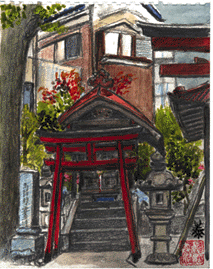Here's the text.
Hazawa Inari
Last Updated September 10, 2024
Please note that the content introduced here may differ from the current one.
32.Hazawa Inari (1-103, Nishitobe-cho)

Inari is the turn of Inao, and is said to have worshiped the Kura Inatamagami, who controls the five grains.
However, Fushimiinari in Kyoto is Shinto, whereas Toyokawainari is the Soto sect En Fukuyama Myogonji, a Buddhist sect. This is the main ancestor of the temple. In other words, it can be said that it is a synonymous with Shinto and Buddha (*).
The Inari religion spread not only to food, but also to countless people throughout the country because of its wide range of defense, including domestic security and thriving business.
By the way, Hazawa Inari was forced to relocate several times to this day, but since Taisho 6 (1917), it has been enshrined at its current location. Although it is small, there is also a kagura hall, and the fox of the goddess is also adorable.
※A religion that links Shinto and Buddhism. It is also called a synagogue.
Bun, picture Tai Hasegawa (presidency of the Nishi Ward Cultural Association Kitora Association)
Inquiries to this page
Nishi Ward General Affairs Department Ward Administration Promotion Division Public Relations Section
Telephone: 045-320-8321
Telephone: 045-320-8321
Fax: 045-314-8894
Email address: ni-koho@city.yokohama.jp
Page ID: 755-272-835













